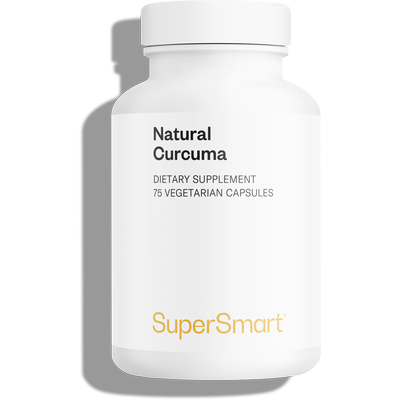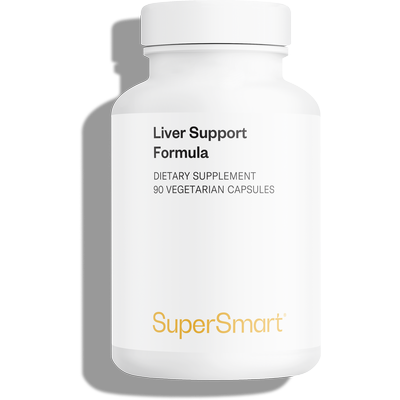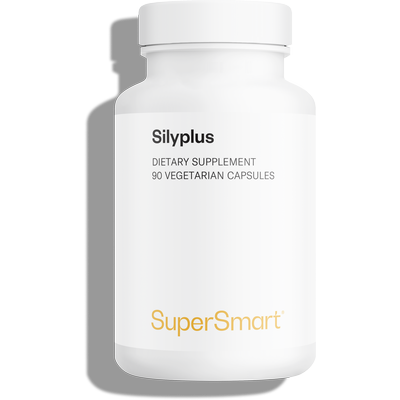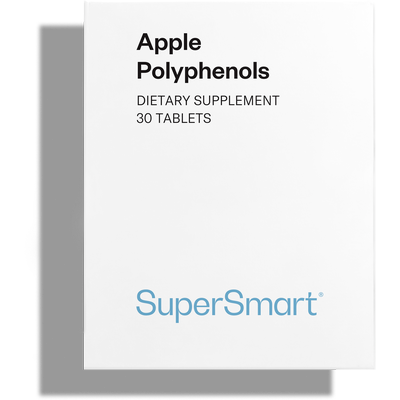5 natural products approved for cleansing the liver
 Which of the body’s organs suffers most from the evils of modern lifestyles? Which is most affected by the pollution, pesticides, additives, toxins and sugars with which we are confronted on a daily basis?
Which of the body’s organs suffers most from the evils of modern lifestyles? Which is most affected by the pollution, pesticides, additives, toxins and sugars with which we are confronted on a daily basis?
Yes, you’ve guessed, it’s the liver. Since it’s directly responsible for breaking down toxins in the body, it’s the liver which is in the firing line.
And while it has an amazing capacity for self-regeneration, these days this is no longer enough to maintain good health. More than 30% of people in the West are suffering from liver disease, with all the evidence suggesting that this is merely the tip of the iceberg (1). The problem is that when the liver is in poor health, the body can’t work properly.
This is something you may already be aware of since there seems to be a growing number of people for whom a regular ‘liver-cleanse’ is a priority. And unfortunately, this trend has not gone unnoticed by those peddling false promises: there are countless natural detox products on the market, most of which offer no scientific explanation for the claims made for them, either because there isn’t one, or because you’re judged incapable of understanding it.
Yet as we’re about to show you, the mechanisms of action involved in cleansing the liver are completely accessible.
The foods your liver doesn’t like
You’ve probably got this image of the liver battling all day long against thousands of different toxins. And you’d be right, except that it obscures the devastating role played by one specific molecule which has long been viewed positively by the public: fructose.
Fructose is a carbohydrate found naturally in fruit: it is different from glucose which is present in all plant types. Until very recently, our consumption of fructose was low but with the advent of modern sugar (a combination of glucose and fructose) and the industrial conversion of glucose into fructose (used abundantly in the agrofood industry) our bodies have become inundated with this ultra-sweet molecule.
 We now know that fructose is only used by the liver and its metabolism is unregulated (2). This in not the case with glucose, excesses of which are buffered by insulin and which is used by every cell in the body.
We now know that fructose is only used by the liver and its metabolism is unregulated (2). This in not the case with glucose, excesses of which are buffered by insulin and which is used by every cell in the body.
This unlimited metabolism of fructose leads to dire consequences for the liver. It is quickly overwhelmed by this far from essential carbohydrate, and is forced to store it in the form of fat cells (lipogenesis). In doing so, it secretes VLDL, large, fat-transporting molecules, which become converted in the blood into ‘bad’ cholesterol. (3).
Over time, the liver becomes congested with fats, triggering chronic inflammation and functional impairment.
Vicious circle caused by inflammation of the liver
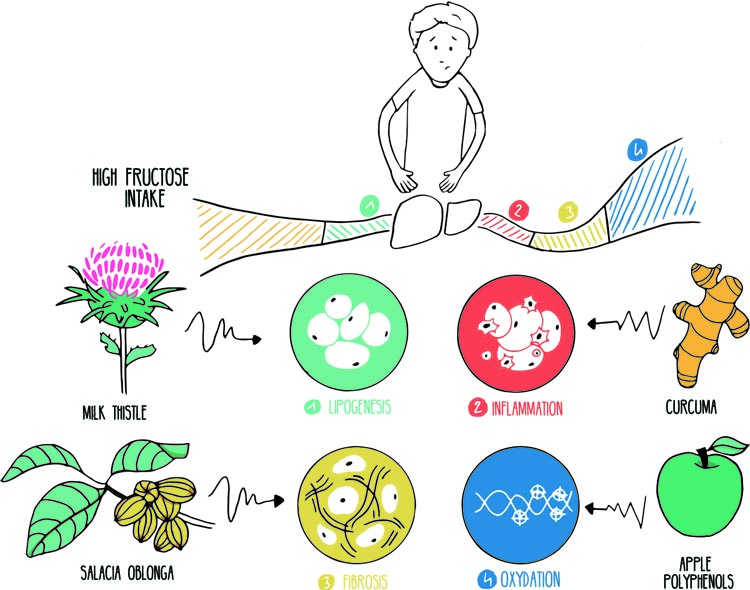
This inflammatory response in the liver acts as a kind of warning. It tells the body that something has gone wrong and that it needs to react fast to replace the damaged elements with completely new ones: this is the well-known process of liver regeneration.
If the sources of disruption persist, however, for example in the case of alcoholism or long-term over-consumption of fructose, the inflammation becomes chronic: the body keeps on producing new elements to replace damaged ones. This is a real problem as this production occurs at a faster rate than the deterioration: cellular components end up accumulating between cells, reducing exchanges and gradually isolating cells from each other. This process is known as liver fibrosis. It is an irreversible and particularly destructive development. It reduces the liver’s ability to eliminate toxins and exposes liver cells to oxidative substances which exacerbate the process.
However, we can act to stem the damage and fully restore the liver’s integrity by influencing these various stages, summarised below:
- lipogenesis (the formation of new fat cells by the liver);
- inflammation of the liver;
- liver fibrosis;
- oxidative damage to liver cells;
- repair of this damage (regeneration of the liver).
The mechanisms of action of the five natural products we have chosen act precisely on these stages.
1) Silymarin
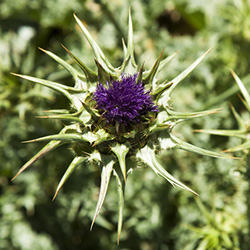 This is probably the best natural product for cleansing the liver. Extract of milk thistle or silymarin (Silybum marianum) has an excellent reputation and its long-term use is considered to be completely safe (4).
This is probably the best natural product for cleansing the liver. Extract of milk thistle or silymarin (Silybum marianum) has an excellent reputation and its long-term use is considered to be completely safe (4).
It is thought to have three main mechanisms of action (5):
- It protects liver cells by stabilising their cell membranes and helping to make them permeable.
- It prevents the liver from forming new fat cells (6) by in particular reducing the expression of several genes (SREBP-1c, LXRβ et FAS) which are highly stimulated by a fructose-rich diet and which are undoubtedly involved in the storing of fats within the liver (7).
- It supports the body’s antioxidant system.
All these effects are the result of a complex cascade of intracellular signals. To make sure you benefit from supplementation, choose only silymarin products that contain at least 30% silybin, the most important active principle, such as is the case with Silyplus.
2) Curcumin
While it is not particularly known for its benefits for liver problems, the evidence is there (8-9). Its principal mechanism relates to inhibition of liver inflammation and support for the antioxidant system (10-11).
It reduces levels of several molecules which increase inflammation (pro-inflammatory cytokines) such as tumour necrosis factor (TNF-α) and interleukin-1, as well as chemokines and acute phase proteins produced by the liver such as CRP (C-reactive protein).
At the same time, it reduces overall oxidative status, ie, the number of toxins and level of aggression, while increasing the activity of glutathione peroxidase, an antioxidant produced naturally by the body.
Here again, it’s important to prioritise turmeric supplements with a high curcuminoid content.
3) Polyphenols from hawthorn or apple
Like curcumin, polyphenols from apples or hawthorn (particularly chlorogenic acid, epicatechins, rutins and hyperosides) modulate inflammation of the liver and oxidative stress by inhibiting certain cytokines (TNF-α, IL-1 and IL-6) and increasing the activity of endogenous antioxidants. They also appear to help repair mitochondrial damage in liver cells.
4) Salacia oblonga root
Though little-known today, Salacia oblonga was for a long time used as a medicinal herb for preventing and treating problems of diabetes. Scientific studies have since shown that our forebears were right: extracts of this plant have been shown to improve several liver diseases, and in particular, the process of liver fibrosis mentioned above (12-13).
How does it work? In a recent study the plant was shown to prevent the maturation of a gene called SREBP1c which is key to lipogenesis (the formation by the liver of triglycerides and fat cells) (14). In doing so, it helps make the liver less fatty and function better.
5) Resveratrol
Produced by plants as a means of protection from oxidative damage, resveratrol appears to play a much wider role when ingested by animal species.
Several studies have demonstrated its benefits in relation to lipid metabolism, markers of liver inflammation and liver cell integrity. Like Salacia oblonga root, it influences the activity of the SREBP1c gene involved in triglyceride synthesis. It thus constitutes a relatively comprehensive therapeutic approach.
It is also known to activate sirtuins, proteins thought to play a role in extending the life expectancy of many organisms...
And if you can’t decide which product to choose from this list, you can always opt for formulations such as Liver Support Formula which contains silymarin alongside other beneficial substances not mentioned here, such as artichoke leaf extract, Ginkgo biloba and chlorella ...
The study at the centre of this article
Fei Xiong and Yong-Song Guan, Cautiously using natural medicine to treat liver problems, World J Gastroenterol. 2017 May 21; 23(19): 3388–3395.
References
1. Federico A., Dallio M., Masarone M., Persico M., Loguercio C. (2016). The epidemiology of non-alcoholic fatty liver disease and its connection with cardiovascular disease: role of endothelial dysfunction. Eur. Rev. Med. Pharmacol. Sci. 20, 4731–4741.
2. Pariente A. Increased fructose consumption is association with fibrosis severity in patients with nonalcoholic fatty liver disease HEPATO-GASTRO et Oncologie digestive 243 vol. 17 no 3, mai-juin 2010
3. Mayes, P.A. Intermediary metabolism of fructose. Am. J. Clin. Nutr. 1993, 58, 754S–765S.
4. Csupor D, Csorba A, Hohmann J. Recent advances in the analysis of flavonolignans of Silybum marianum. J Pharm Biomed Anal. 2016;130:301–317.
5. Prakash, P.; Singh, V.; Jain, M.; Rana, M.; Khanna, V.; Barthwal, M.K.; Dikshit, M. Silymarin ameliorates fructose induced insulin resistance syndrome by reducing de novo hepatic lipogenesis in the rat. Eur. J. Pharmacol. 2014, 727, 15–28.
6. Bahmani M, Shirzad H, Rafieian S, Rafieian-Kopaei M. Silybum marianum: Beyond Hepatoprotection. J Evid Based Complementary Altern Med. 2015;20:292–301.
7. Prakash, P.; Singh, V.; Jain, M.; Rana, M.; Khanna, V.; Barthwal, M.K.; Dikshit, M. Silymarin ameliorates fructose induced insulin resistance syndrome by reducing de novo hepatic lipogenesis in the rat. Eur. J. Pharmacol. 2014, 727, 15–28.
8. Maithilikarpagaselvi, N.; Sridhar, M.G.; Swaminathan, R.P.; Sripradha, R.; Badhe, B. Curcumin inhibits hyperlipidemia and hepatic fat accumulation in high-fructose-fed male Wistar rats. Pharm. Biol. 2016, 54, 2857–2863.
9. Maithilikarpagaselvi, N.; Sridhar, M.G.; Swaminathan, R.P.; Zachariah, B. Curcumin prevents inflammatory response, oxidative stress and insulin resistance in high fructose fed male wistar rats: Potential role of serine kinases. Chem. Biol. Interact. 2016, 244, 187–194.
10. Maithilikarpagaselvi, N.; Sridhar, M.G.; Swaminathan, R.P.; Sripradha, R.; Badhe, B. Curcumin inhibits hyperlipidemia and hepatic fat accumulation in high-fructose-fed male Wistar rats. Pharm. Biol. 2016, 54, 2857–2863.
11. Maithilikarpagaselvi, N.; Sridhar, M.G.; Swaminathan, R.P.; Zachariah, B. Curcumin prevents inflammatory response, oxidative stress and insulin resistance in high fructose fed male wistar rats: Potential role of serine kinases. Chem. Biol. Interact. 2016, 244, 187–194.
12. Wang, J., Rong, X., Li, W., Yamahara, J., Li, Y., 2012. Salacia oblonga ameliorates hypertriglyceridemia and excessive ectopic fat accumulation in laying hens. J. Ethnopharmacol. 142, 221–227.
13. He, L., Qi, Y., Jiang, J., Yang, Q., Yamahara, J., Murray, M., Li, Y., 2011. The Ayurvedic medicine Salacia oblonga attenuates diabetic renal fibrosis in rats: suppression of angiotensin II/AT1 signaling. Evidence Based Complement. Altern. 2011, 807451.
14. Postic, C., Girard, J., 2008. Contribution of de novo fatty acid synthesis to hepatic steatosis and insulin resistance: lessons from genetically engineered mice. J. Clin. Invest. 118, 829–838.
All rights reserved
Free
Thank you for visiting our site. Before you go
REGISTER WITHClub SuperSmart
of exclusive benefits:
- Free: our weekly science-based newsletter "Nutranews"
- Special offers for club members only



